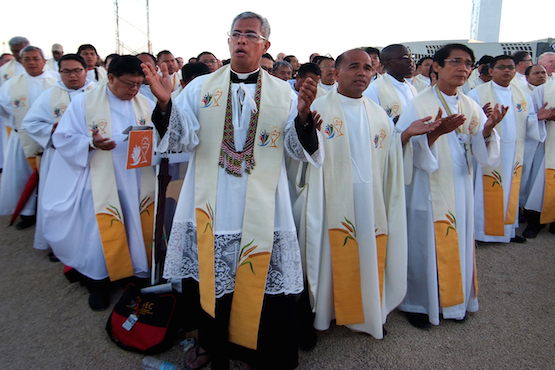
No guns for Filipino priests. Period. Full stop.
That's the stand made by Philippine bishops, who insisted that priests had a duty to "turn the other cheek ".
A spate of priest killings in the Philippines sparked a debate over whether clerics should carry guns. But the Catholic Bishops Conference of the Philippines (CBCP) has spoken out against the idea.
Earlier this week, the Philippines National Police chief Oscar Albayalde said he would help clerics who wanted to arm themselves, as long they acquired permits.
'Men of peace, not violence'
The police chief further said that besides helping in priests obtain gun permits, they would also help them learn how to handle weapons.
Over 200 priests and preachers from other religious denominations want to carry firearms, the Philippine Star reported on Wednesday, quoting Albayalde.
The daily further reported that the police received requests for permit to carry firearms outside residence (PTCFOR) from 188 Catholic priests and 58 ministers, preachers and pastors from June 2017 to June 2018.
“As a policy and by the power vested in me as the approving authority for PTCFOR, we may accommodate requests for PTCFOR by duly qualified gun holders among members of the clergy and leaders of religious congregations, subject to their compliance with the minimum requirements,” Albayalde told the Star.
The Filipino bishops, however, insisted that priests are duty-bound to be “men of peace, not violence”.
Catholic priests against law allowing them to carry guns
On Monday, CBCP president Archbishop Romulo Valles said he “strongly” opposed priests being armed.
The Philippine Daily Inquirer recently quoted an unnamed priests admitting they had bought guns or were considering doing so following the June 10 murder of priest Richmond Nilo, 44.
Father Nilo was shot dead through his church window in front of parishioners as he prepared for mass in Nueva Ecija province, north of Manila.
3 Catholic priests killed
Nilo was the third priest since December to be killed in cold blood.
His murder came days after Father Rey Urmeneta, 64, a former police chaplain, survived an attack by two gunmen south of Manila.
On April 29, Father Mark Ventura, 37, was shot dead after saying mass in northern Cagayan province, while on December 4 motorcycle-riding gunmen killed Father Marcelito Paez, a parish priest also in Nueva Ecija province.
Several politicians are pushing for a investigation into the killings.
President Rodrigo Duterte, a former prosecutor and mayor who came to power promising tough measures against drug dealers and addicts, has also frequently attacked the powerful Catholic Church in the Philippines for speaking out against the killings.
More recently he has begun targeting foreign church workers, including Australian nun Patricia Fox who this week successfully challenged a deportation order for her work advocating for the poor and disenfranchised.
Some bishops have expressed concern that the President’s statements against them may “unwittingly embolden more crimes against priests”.
'Many killings'
Manila auxiliary bishop Broderick Padillo said: “President Duterte has made many pronouncements against the church and also pronouncements for killing drug addicts.
"He even defends the police and their so-called extrajudicial killings. There has been so many killings now. We don’t know whether there was co-ordination in these (priest) killings, but for sure there is a culture of violence and impunity in this country.”
There was “no debate”, however, inside the Catholic Church over whether priests should carry guns — because their calling was to oppose violence and promote peace.
A few priests may have recently acquired guns, according to Philippine media reports.
“The idea that there is a debate about this — that many priests are afraid and arming themselves — does not reflect the view of most”, Padillo told the local media.
“Yes, they talk about it but there is not that kind of fear among us. There is no clamour among priests to be allowed to carry guns.”
Senator Risa Hontiveros, one of several politicians calling for a Senate inquiry, said recently it was a sign of “desperation and hopelessness” that there should even be discussion about priests arming themselves against attacks, let alone going out and acquiring guns.
“When the government cannot guarantee the public’s safety and security, and worse, is seen by many citizens as involved in many of the killings, the people will take it upon themselves to defend their lives,” she told the Inquirer.
The Philippines recently changed its gun laws, expanding the categories of people who may legally carry licensed weapons to include those “under actual threat or in imminent danger due to the nature of their profession, occupation or business”.
Among that list are accountants, accredited journalists, bank tellers, businessmen, engineers, imams, lawyers, ministers, nurses, physicians, priests, and rabbis.
These people may apply for weapons licenses after first undergoing drug and psychological tests, and so long as they have no criminal record, can produce valid tax returns and proof of income.











